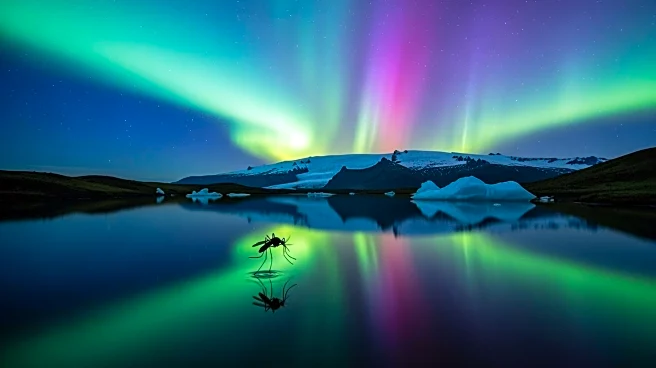What's Happening?
Mosquitoes have been discovered in Iceland for the first time, as warming temperatures make the region more hospitable for the insects. The species identified is Culiseta annulata, known for its cold resistance.
The discovery was made by citizen scientist Björn Hjaltason, who expressed concern over the implications of mosquitoes establishing themselves in Iceland. The presence of mosquitoes in Iceland highlights the impact of climate change on ecosystems and the potential for the spread of mosquito-borne diseases. The situation raises questions about the long-term effects of climate change on biodiversity and public health.
Why It's Important?
The detection of mosquitoes in Iceland serves as a stark reminder of the broader implications of climate change on ecosystems and biodiversity. As temperatures rise, mosquitoes can expand their range, increasing the risk of diseases such as malaria and dengue in regions previously unaffected. The presence of mosquitoes in Iceland underscores the need for global efforts to address climate change and mitigate its effects on vulnerable regions. The discovery also highlights the importance of monitoring and controlling mosquito populations to prevent the spread of diseases and protect public health.
What's Next?
The presence of mosquitoes in Iceland may prompt further research into the impact of climate change on insect populations and the potential spread of mosquito-borne diseases. Scientists and public health officials may need to develop strategies to monitor and control mosquito populations in newly affected regions. The discovery could also lead to increased public awareness and efforts to address climate change and its effects on ecosystems. As temperatures continue to rise, similar discoveries may occur in other regions, highlighting the need for proactive measures to protect public health.
Beyond the Headlines
The detection of mosquitoes in Iceland raises ethical and environmental considerations regarding the impact of climate change on ecosystems and biodiversity. It highlights the need for global cooperation to address climate change and protect vulnerable regions from its effects. The discovery also underscores the importance of citizen science in monitoring environmental changes and contributing to scientific research. As climate change continues to alter ecosystems, the role of citizen scientists may become increasingly important in detecting and responding to environmental shifts.








